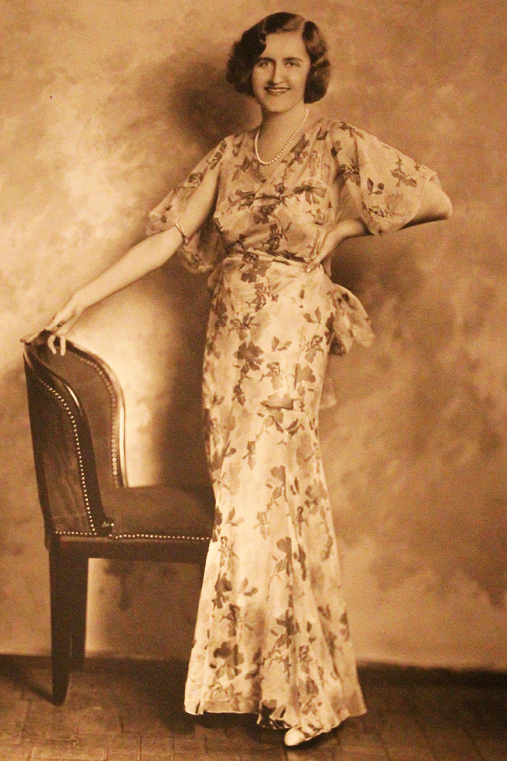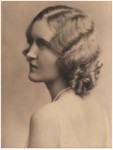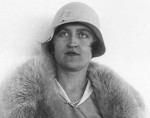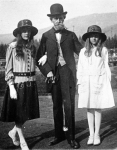Kaiser’s Take: I was the one to choose Empty Mansions for our Celebitchy Book Club this month, and I sort of regret that choice. I thought it was going to be an epic story of wealth and jewelry and living an extreme life over the course of a century. That’s not what it was, though. It was the bizarre story of a woman named Huguette Clark, a woman who was the youngest child in a fabulously wealthy family, who spent her entire life never wanting for anything financially, but who basically did nothing with it.
Well… “nothing” is a bit strong. She inherited or bought and maintained luxurious mansions, estates and luxury apartments, she spent a crazy amount of money on art and dolls and her little “projects,” and then in her last decades, she gave millions of dollars to one of her nurses. I guess I was expecting Clark to have at least a few years where she vacationed extravagantly or had a major jewelry-buying binge (something, please!). When you hear stuff like “one of the great American fortunes” and “one of the richest heiresses ever,” you expect a story rich in fantastic spending sprees, something to enjoy vicariously as you imagine what YOU would do with that kind of money. And therein lays one of the big problems with the story of Huguette Clark.
First, some backstory… and the book includes a lot of backstory on the Clark family. Huguette’s father, W.A. Clark, was once one the richest men in America, and it was all self-made in his case. He ran an empire of silver and copper mines in the West, and Huguette was his youngest child, the second child of his second marriage, born when her half-siblings from her father’s first marriage were well into adulthood. W.A. Clark was an intriguing figure in the 19th century and the early part of the 20th century, and when he died… well, his kids divvied up his fortune, per his instructions. Huguette got her fair share. That was, like, 1925. The Roaring Twenties! It should have been exciting. But from there, the story of Huguette Clark pretty much stays the same.
She marries briefly but quickly gets a divorce. She has a handful of close friends, many of whom receive money from her over the years. She lives in NYC, and while her mother is alive, she travels to their California estate every so often. But basically, for the last half of her life, she rarely travels out of NYC. She lived alone for decades, collecting dolls and having specially designed dollhouses made. She was obsessed with cartoons. She loved Impressionist painters, and she painted for a time as well.
Now, was she just a solitary figure, happy being by herself? Was she afraid that one day, the revolution would come and all of the rich people would be taken away? Was she autistic? I was halfway through the book when I began to think she was a high-functioning autistic. And after I finished the book… yeah, I still kind of think that. The last part of the book is kind of rough. I think the authors were afraid of being sued so they tried to play devil’s advocate over every single little thing, but it seems pretty clear that the hospital was treating Huguette poorly and that her nurse, business manager and lawyer were into some really shady crap.
I chose this book after seeing it included on a lot of “Best Books of 2013” lists, with everyone talking about how it was this crazy story of fortune and loss and weirdness… but mostly it’s just depressing. You can’t even really enjoy Huguette’s spending vicariously because she just seems like such a strange, eccentric woman. I felt bad for her.
Bedhead’s Take: I think this is the first book club selection that I came off questioning as a whole. The authors seemed to lose track of their assumed objective: to tell us more about the hidden world of Hugette Clark. Perhaps Kaiser has correctly guessed that the writers feared legal repercussions, but the non-revelations of the story were a letdown. The book starts by outlining the basic mystery and covers a lot of fact-based territory but doesn’t teach us anything new about the actual mystery. From the very beginning, we are told that Hugette was an eccentric lady who retreated into solititude for most of her life. We also already know that she was surrounded by a small circle of legal and financial advisors as well as paid help, and somehow, she ended up leaving a whole lot of money to these people instead of what her original will dictated.
By the end of the Empty Mansions, we learn nothing new about how this happened. Instead, we merely receive a bunch of unnecessary history about mining that caused my mind to wander. I did skim much of this middle material because …. where was Hugette? By the time the authors got back to her, I was pretty excited to finally learn some new stuff about the mystery. Alas, that did not happen. The authors merely let us know that Hugette wrote a bunch of checks, the hospital got pissy that she didn’t donate enough money, and she never ventured outside except on one car ride where she wore a blindfold. So I get it, Hugette was a hermit, and she gave a lot of money away. The reader is left with a ton of footnotes and no feeling of resolution.
Celebitchy’s Take: This book had a lot of potential, but just got lost in the details. I co-sign Kaiser and Bedhead’s opinions that Empty Mansions did not live up to the hype. This was an incredible story, on the surface, that Dedman and Newell somehow managed to make boring. At the beginning of the book, they promised not to editorialize and it was very much to the story’s detriment. They wrote “We have invented no characters, imagined no dialogue, put no thoughts in anyone’s head.” What was left were entire passages describing photos and paintings, long excerpts of letters, and dry depictions of amazing circumstances and outlandish, bizarre spending. All of this warranted a breathless retelling, a raised eyebrow, something to indicate that it was as shocking and outlandish as it seemed. I kept waiting for something to happen, but even when it did there was no payoff.
This could have been a fascinating book about a reclusive centenarian with bizarre hobbies, taken advantage of by her greedy, entitled nurse, the hospital where she stayed for decades, and her lawyers. Empty Mansions was an account of Huguette’s life story that got bogged down in details and didn’t do it justice.
At the end of the book, Huguette Clark’s will was still being contested and her $308 million estate had not yet been divided. Just last week, the estate was settled. Huguette’s relatives, the great-grandchildren and great-great grandchildren from her father’s first marriage, will receive $34.5 million. The estate will pay their taxes and all legal fees. Huguette had deliberately excluded all her relatives from her will and had left $30 million to her nurse, Hadassah Peri, who had already received $31 million in gift checks from Huguette. Under the settlement, Peri receives no additional money and was ordered to repay $5 million to the estate. The estate also establishes an arts foundation that will control Bellosguardo, the $108 million family mansion in Santa Barbara that Huguette had not visited in over 50 years but insisted be kept the same as she remembered it, down to the placement of the furniture. It should be opened to the public at some point.
Next Selection
The next selection for the Celebitchy Book Club is the new John Grisham novel, Sycamore Row. It involves some of the same characters as A Time To Kill, but you don’t need to know the back story to enjoy this novel. Plus, Grisham books are always easy to get through! We’ll be discussing the book on March 15th (we’re giving everyone an extra week because we don’t want it to bump up against the Oscars!).



















I loved this book, but maybe that’s because I knew precisely what type of story this would be prior to reading- I had no illusions going into it about her living an extravagant lifestyle. In fact, I had been following her story ever since the announcement of her death and the subsequent “wait, she was still alive?” stuff that followed. I really enjoyed learning about Huguette’s father and the juxtaposition between this gregarious outgoing father and incredibly private daughter. It’s interesting to read about wealth in this day and age where anyone and everyone with money can become a “star” but this woman lived 100 years under the radar and contrary to what the bloggers have expressed above I think she had a full and fascinating life exploring her varied interests in the privacy of her own home – she was intelligent and thoughtful, fluent in a couple languages and was a very strong, albeit eccentric, character. Absolutely recommend this book.
I would completely agree with your entire review of this book. You have tobcome to read it and think of Hugette Clark as a sort of anti-poor little rich girl, aka the Barbara Hutton type. The exciting thing about her life for me was that she actually did live in a private lavish manner, and utterly uniquely.
First I want to say thank you for picking a non-fiction title for your book club. I have read this site for years and I have never commented in the past. I am commenting for the first time because I love non-fiction and I was very excited when you selected this book because it was on my list of books that I wanted to read at some point.
I think that this book was an incredibly sad story which showed how money can corrupt and distort a life. I don’t think Huguette was Autistic or mentally deficient – I think she was incredibly sheltered and never learned how to deal with others or with life in general.
The fact that she always had an incredible amount of money at her disposal led to a situation where she did not learn how to function as a normal person. Clearly the fact that her mother preferred that she stay at her side did not help the situation. Huguette’s incredible paranoia and lack of understanding of the value of money and material items and her inability to distinguish who was trustworthy and who was not was due to her total lack of experience of living as a normal human being. She was obsessed with stopping time in the way she wanted to preserve every thing in her homes. She was unable to deal with the fact that people die and life moves on because her mind had been so warped by her financial situation and her sheltered life.
She became too comfortable in her sheltered world and it distorted her mind and the way she lived her life in every way up to the point that she never left that hospital (where they clearly took horrifying advantage of her) for 20 years.
I think this was an incredibly sad story of a woman who wasted talent and most of her life. I think it shows that having a lot of money can do more harm than good.
I thought this was an incredibly sad book too. For someone who supposedly didn’t trust the outside world (because people would only want her money), it’s a shame she ended up surrounded by people who either paid by her or stood to benefit from her largesse. She didn’t have a single advocate for her best interests, and I think a lot of people took advantage of her naiveté.
But the book was disappointing because in its attempt not to offend, it was dull. In not offending anyone, the authors ended up missing some key points: for example, doctors and nurses who didn’t directly benefit financially claimed Huguette was of sound mind and body, yet the book also details the absurd lengths the hospital administration was willing to go to to guarantee a large donation. You think those doctors and nurses might have known that when examining her and/or her charts? Who would want to risk his or her career by saying the hospital was taking advantage of an old, rich woman?
Plus, just because something doesn’t rise to a legal level of undue influence doesn’t mean it’s acceptable. It bugged me that Dedman and Newell seemed to be arguing that point.
One slightly off topic question: did anyone find it odd that W.A. Clark was painted as this completely above-the-board businessman, who just happened to be shrewd enough to amass one of the largest fortunes in America? I don’t think his story is that simple, especially since there were a few questionable transactions, which were always, always foisted off on other members of his family. No doubt he had a skill for making money, but there’s a difference between making money and raking in piles of dough.
Parenting makes the person, and her personality was clearly a result of upbringing. Having a big bank account doesn’t force a person to become a shut in. That amount of money can attract vultures, no doubt, but a confident person can overcome adversity.
It sounds like there was untreated abuse or neglect, and her family let her fend for herself. This is really the tale of a lonely person; homeless people are neglected adults too, with nothing material to distract from the abyss of social deprivation.
Non-fiction can be tough to get into for people who prefer the “flow” of fiction. I tend to read a lot of historical non-fiction so I enjoyed this book a lot. The one thing that kept running through my mind while reading this was: why the heck couldn’t I inherit a chunk of money like that? I wouldn’t waste it being a hermit.
I read nonfiction regularly, but I found this one pretty flat.
And I agree about the money – although, reading Huguette’s story, I don’t think I want a huge chunk. Just enough to live comfortably.
I thought the book was excellent. She didn’t have a flashy, empty, typical rich person type of life; she had precisely the type of life she wanted.
Apparently she didn’t live to impress other people. Some of the reviewers seem disappointed by this.
I’m not sure that is fair. The disappointment seems to arise from the perceived failure of the authors to expand on the rich tapestry of Clarke’s life and shed new light on the intricacies of her solitary, but full, life. If what you said was true then the reviewers would be judging Clarke’s life as opposed to the recounting of it. And that doesn’t strike me as the case.
I really enjoyed reading this book. It was nice to read non-fiction.
Are we allowed to recommend books to the club? If yes, please may I recommend ‘the worst date ever’ by Jane Bussmann
I was curious about Huguette Clarke’s story, but after finishing the book, I feel like I got more info from the various New York Times articles written about her. The book has no real structure, the authors lose the plot several times along the road and wander off into things that don’t help the story. They seem to be happy to share all the details they amassed, some of which are fascinating, but they don’t help creating an image of who Huguette really was.
I really enjoyed this book. I grabbed it from the library as soon as it was available. I didn’t know who Hughette Clark was until after I came across an interesting article on MSNBC. An article written by Bill Dedman. I know a lot of people wished there was more insight into her life but since she didn’t leave any journals, we are pretty much left to wonder why she lived the way she did.
I do think her sister’s early death affected her. Whether her mother gloammed onto her because of the death of a favored child should be considered. Her co-dependent relationship also prevented her from having a lasting relationship with men.
I loved everything about the gilded age therefore it was nice to see pictures of the demolished Clark estate and some of her personal possessions.
The hospital and that nurse plus the goons who ran her estate are suspect. I believe her estate is suing the hospital. At one point I think the city attorney was looking into the hospital’s shenanigans.
WA Clark founded Las Vegas. We should be thankful for that!
I grew up in Santa Barbara county, and believe me her beautiful empty mansion on the bluffs above the south end of town has always prompted lots of curiosity. The public estuary below the home is named for her sister Andree. With the recent settlement of her will, the formerly empty mansion will now be filled with tours and art activities which is great for the central coast.
I found her story kind of heartbreaking because after about 50 million euphemisms based on the words ‘eccentric’ ‘unconventional’ and ‘shy’ it’s pretty clear she was severely mentally ill. Sort of made me want to grab a few fistfuls of modern anti anxiety, psychotic, and depression drugs and teleport backwards in time! And I agree with the previous post about her father; he seemed much more sinister and sexually shady than let on in this story.
I read it for local color, but came away with the feeling it was a cautionary tale against living a solitary existence without healthy financial or emotional limits. Hello, Michael Jackson or Justin Bieber!?! Heh…
Did the part about her jewelry being stolen not once but twice from a major US banks’ vaults disgust anyone else? Someone there obviously recognized and exploited her bizarre need for privacy at all cost! In the end she had more financial fleas sucking on her estate than a Sochi street dog, but it’s hard to see how it could have ended any other way. A sad story, told rather pruriently…
The jewelry thing disgusted me. That was awful. I mean, I think quite a few organizations and people took advantage of her, but the bank one was especially galling.
Prurient is the perfect word to describe this book. It’s an interesting story, but I was uncomfortable reading it. I felt very much like a voyeur.
Yes, I agree with you about the jewelry thing. I can see how it could happen, particularly when she hadn’t touched the stuff for years, but it’s still a shame. Just proves that old saying about where you put your treasure is where you put your heart. Don’t bury it, use it.
I don’t agree, however, that she was mentally ill. I’ve known other rich people – not as rich as Hugette, but rich – and one of the main differences is that they don’t have to sand off their edges to fit into society, the way us ordinary people do. She didn’t have to marry, as many women did for economic reasons in those days. She didn’t have to please anyone but herself. And, apparently, she did.
I don’t think Justin Bieber or Michael Jackson is a fair comparison. They are/were dealing with fame, not just wealth. People have tremendous expectations for them they never had for Hugette.
I loved it too. Huguette was so unique and eccentric. Most rich-girl stories are about how they wasted their money on playboy husbands, raised messed-up children, and became shriveled alcoholics.
I thought it was fascinating how she lived. And she didn’t cut off her relatives in her will; they were all descendants from her father’s first marriage and got their own share of his fortune when he died.
All of her half-siblings were long dead by the time she died – they passed their own money to their children and grandchildren. Huguette was much younger than they were and lived to such an old age that the remaining relatives are probably three or four generations behind her.
Thank you for this information, this is fascinating and helpful.
I’m really looking forward to this book!
Wish I had the time to read the book. I watched some show on her years ago and I was very intrigued and started a little research into her. I am a turn of the century history buff though so that’s probably why I find her fascinating.
I have this on my Kindle and am looking forward to it. Reading Ian Rankin’s new Rebus book now.
I didn’t read this book – first one in the CB book club I haven’t read – because there are two authors and I prefer books by single authors, since a big part of my enjoyment of any book is its author’s voice. That said, I now think I may read it because I’m interested in Huguette and what motivated her actions. Interesting story, it sounds like.
This one really didn’t look like my kinda thing so I’m hors de combat this time. I promise to read the Grisham, however!
Loved Huguettes story, the rest of the characters not so much. I would have liked to see more of her projects illustrated.
That’s an excellent point. She spent much of her time working on her various art projects. It would have been nice to see more of them.
After Sycamore Row, maybe we can read a classic. I could sit down and read The Razor’s Edge.
I read the book as soon as it was available and found it to be interesting and very sad. All the above reviews are excellent in their own way, so I won’t elaborate but if you find stories about real people and real life to be interesting, you will like this one.
I liked the book mostly because it covered a lot of US history in the course of outlining the lives of the Clark family members, and I learned a lot about the politics and economy of the times referenced. Like Kaiser, though, I too thought there would be a little more razzle-dazzle – intrigue, lovers, drama. I felt a little let down once Huguette turned out to be basically a reclusive, asexual doll-hoarder who became a sad cliche once relatives and caregivers started fighting for her bucks. What I liked most about her was her artistic bent; I was quite taken with her painting of the view of Fifth Avenue through her bedroom window.
What I found most appalling was the hospital’s treatment of her in connection with its “donor development” strategies — alternately playing on her fear of change to scare her, and then sending various ass-kissing visitors to her bedside, order to leverage a hefty bequest. Makes me glad, for once, that I’m not rich.